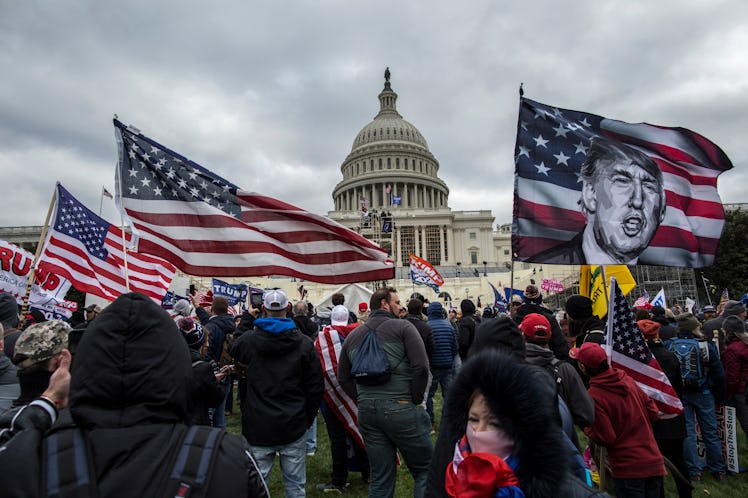
Here's An Expert's Take On Whether The Capitol Riot Was Really A Coup
No matter what you want to call it, what happened at the U.S. Capitol on Jan. 6 was a low point for American democracy. Across social media and the real-life spaces of the country, many people called the siege at the Capitol a coup, intended to stop the counting of the 2020 electoral ballots and thus the transition of power from President Donald Trump to President-elect Joe Biden. But, was what happened at the U.S. Capitol actually a coup, in the strictest sense?
“What we're seeing here is an attempt using force to overrun the U.S. Capitol. But it does not, in my mind, rise to the level of a coup d’etat,” says Erica De Bruin, Ph.D, an assistant professor of government at Hamilton College and the author of How to Prevent Coups d’état: Counterbalancing and Regime Survival. Per De Bruin, a real coup — the intent of which is to put or keep someone in power — requires a “credible show of force,” usually from the military or other state security force. While multiple Republicans in Congress acted in support of Trump’s false claims that the election had been stolen, De Bruin notes their protests didn’t go beyond rhetoric. “I don't think any of them are willing to sign off on the threat or use of actual state force, and that's what you would need to have,” she says.
The events of Jan. 6, while frightening, didn’t quite rise to that level. That day, a mob of Trump supporters, roused following a rally at which the president repeated baseless claims of election fraud, stormed the U.S. Capitol building. Photos and videos showed the insurrectionists overwhelming security, forcing their way into the building, and running unchecked through legislator’s offices and the legislative chambers. Lawmakers, who were in the process of certifying President-elect Biden’s election, were forced to evacuate or shelter in place. At least five people were reported dead due to the riot, per The Guardian.
Given this was an unprecedented event, many people are struggling with what to call it — a riot, a violent protest, a rebellion, a coup? And opinions have diverged. In an op-ed published by Politico on Jan. 11, former deputy assistant to the president and senior director for European and Russian affairs on the National Security Council Fiona Hill went through a bullet-pointed list of ways she thought it met the standards of a coup, including putting pressure on the military and social media propaganda, using the context of Trump’s actions over the past four years. “As in the case of other coup attempts, the president’s actions have put us on the brink of civil war,” she wrote.
While De Bruin understands the appeal of the “coup” label to define the seriousness of the situation, she thinks that “violent protest” or “insurrection” is more accurate. “President Trump has been pulling all sorts of shenanigans since he lost the election in November to try and remain in power,” she says. “We categorize those attempts as not traditional coup attempts, but maybe self-coup attempts, where you try and not unseat someone else, but stay in power yourself. But even that requires the credible threat of force, and usually that comes from the military or other state security forces.” Trump, she says, doesn’t have that support from the U.S. military leadership.
While the riot wasn’t technically a coup, it was “part of a broader pattern of democratic backsliding,” says De Bruin. “That involves a range of anti-democratic actions that are trying to chip away at the norms and institutions that sustain democratic rule.” These actions can include trying to bring violence into political life, inciting violent protests, and casting doubt on election results or saying they won’t be respected.
The distinction is important. “Why it matters to clarify whether this is a coup or not is [because coup dynamics] largely happen within the military. So to stop coups we need to try and change incentives for military actors. To stop other types of authoritarian power grabs, or other types of authoritarian or anti-democratic actions like we're seeing now, the people that matter for that are political elites. And in this case, they're the elites within the Republican Party.” De Bruin points to the ever-expanding tolerance for Trump’s harmful behavior over his four-year term, and particularly the enabling of his claims of election fraud in recent months.
“Attention and pressure needs to be put on Republican elites, in particular, to accept the rules of the game here,” De Bruin says. “That’s how we define democracy: Both parties, or all political parties that are competing, agree to the rules for how there's going to be transfers of power and that people accept the results of an election that they lose. That's what you're really seeing. It’s dangerous fraying, right now, of [those] kinds of norms of accepting.”
Based on her expertise, De Bruin predicts increasing violent protests in the days and weeks to come. On Jan. 11, an internal FBI memo warned of possible armed protests at state Capitols across the country starting Jan. 16 and going through Inauguration Day on Jan. 20. In Washington, D.C., up to 15,000 National Guard members could be deployed ahead of the inauguration, per The Washington Post.
In the meantime, congressional Democrats are moving forward with efforts to impeach Trump with less than two weeks to go before the end of his presidency. On Jan. 11, House Democrats introduced an article of impeachment against Trump, charging him with “incitement of insurrection,” and simultaneously announced that they had the votes to impeach, setting up a trial in the Senate. The House is likely to vote on Jan. 13.